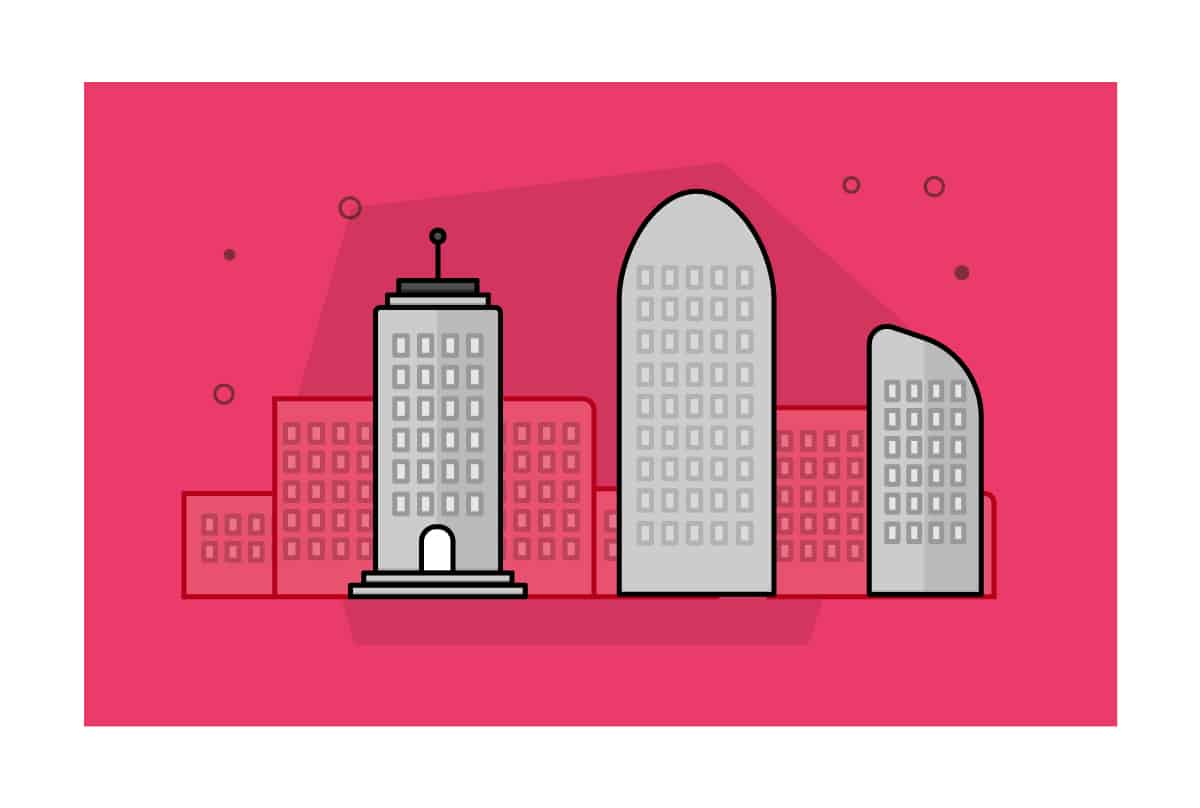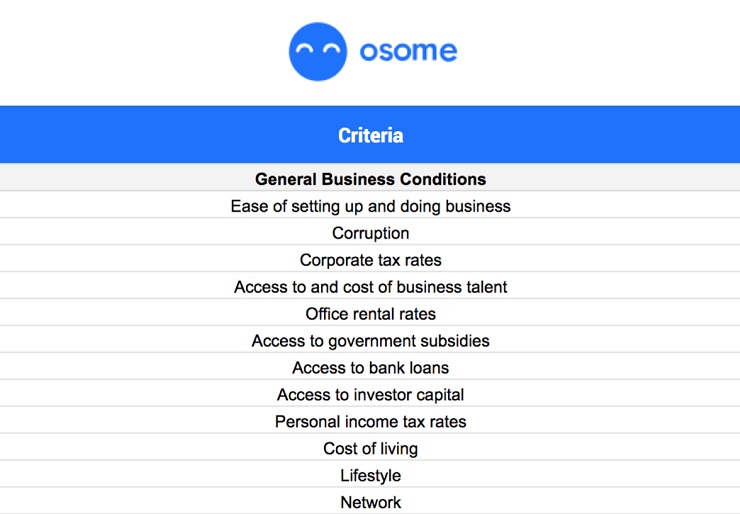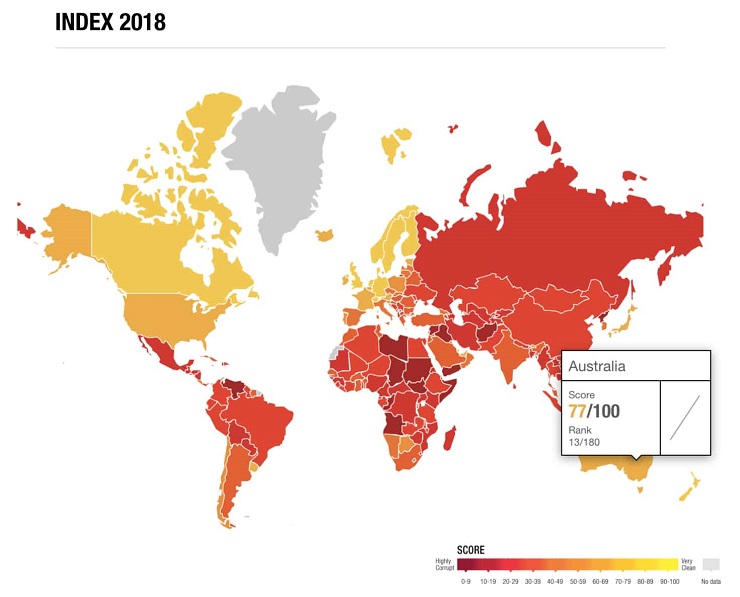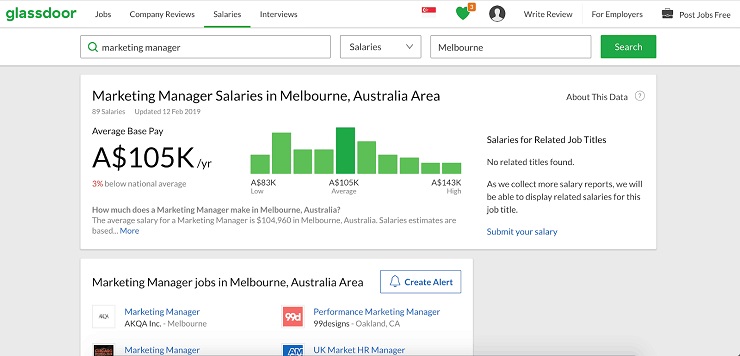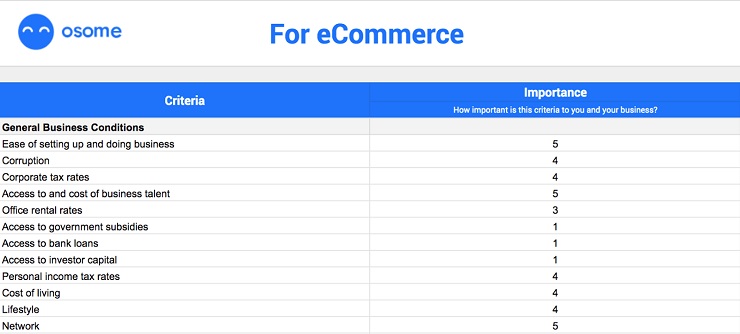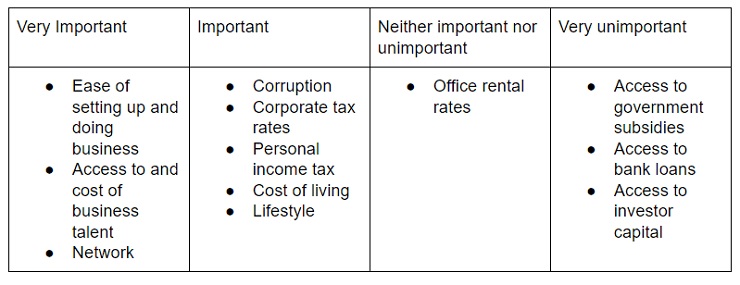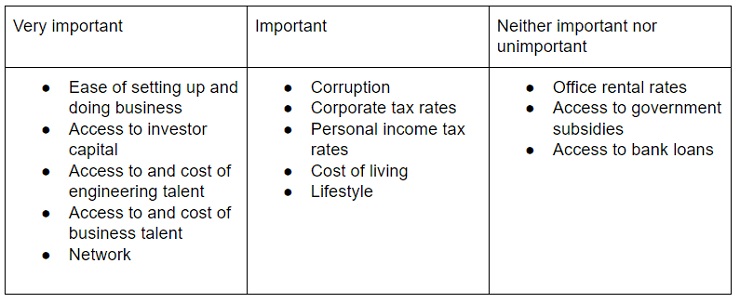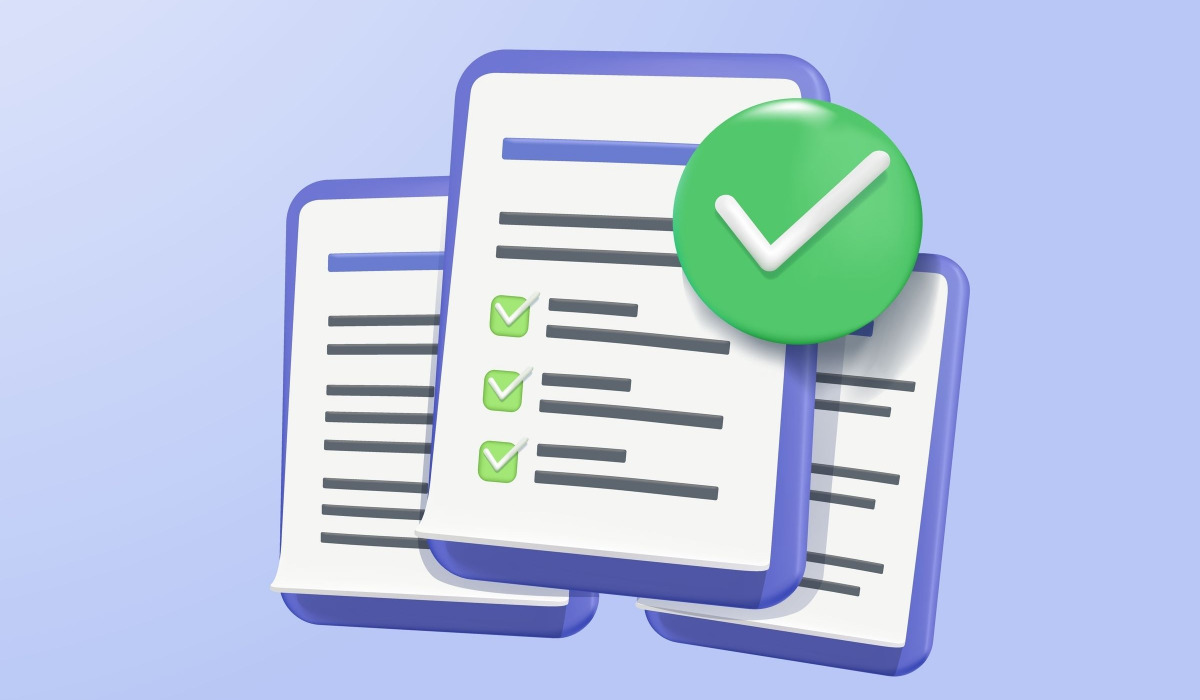Today, all it takes is a solid internet connection to start and scale a business, from any city, for almost any industry. The Sweat fitness empire started from Adelaide, online dating platform Bumble started in Austin, Texas, and shopping app Carousell started in Singapore and is now valued at over $550 million.
So if you are a young or otherwise adventurous entrepreneur deciding on where to start a business, you may be overwhelmed with possible choices. Maybe you want to move to a big, bustling city, but are concerned about the costs. Or you fear your hometown is too isolated. Then you meet someone who asks why you aren’t in Silicon Valley, the mecca of the startup world.
You’re not alone. This decision is causing a lot of people real anxiety.
That’s why we’re going to show you a decision-making tool you can use, on repeat, to score the compatibility of any city, for any business. You’ll also get free Google Sheets templates you can tailor to score different cities, and we’ll show you exactly how to use it.
EXCLUSIVE FREE TRAINING: Successful Founders Teach You How to Start and Grow an Online Business
Can You Decide Later?
You could, but changing your headquarters later is going to be costly. If you don’t believe us, ask the guys at Grab, the ride-hailing unicorn.
Before acquiring Uber’s Southeast Asia operations, they famously uprooted their headquarters from Kuala Lumpur, Malaysia, to Singapore. Imagine the cost and pain of moving your entire HQ to another city, a couple years after setting everything up. Ouch.
Let’s take a look at our scoring system and how to fill out the spreadsheet so you can choose the best place to start your business.
The Core Principle and Concepts of Scoring Cities
The fundamental rule behind our scoring system is that a city’s score on any criteria is a function of two things (Importance and Strength).
A city’s score on any criteria = Importance x Strength
When you are going through each criterion for a city, you will score it based on these two parameters:
Importance
We use a 5-point scale to judge a criteria’s importance, where 1 means this criteria is not at all important to your business, and 5 means it is very important.
Let’s say you’re developing a technology product and your business cannot take flight without a dedicated team of developers. If that’s the case, then the access to talented developers in a city is very important. You’d give this criteria an importance score of 5.
Strength
How strong is a particular city in the same criteria? Again, we use a 5-point scale, where 1 means very weak, and 5 means very strong. You’ll need to do a bit of research to give cities a strength score.
Let’s say that you know that both City A and City B have vibrant tech scenes with large pools of talented developers. But what about salaries? An easy way to check this is to hop onto Glassdoor and compare the salaries of full stack developers in both cities.
After a bit of internet sleuthing, you have found that City A’s large pool of talented developers have relatively affordable salaries—it gets a strength score of 5. City B also has a large pool of talented developers but they’re more expensive—it gets a strength score of 4.
Multiply the importance and strength scores to get the city’s score:
City A’s Score = 5 (importance of criteria) x 5 (strength) = 25
City B’s Score = 5 (importance of criteria) x 4 (strength) = 20
Your Criteria for the Best Cities to Start Your Business In
We recommend taking a couple of days to write down everything that comes to mind as possible factors that influence where you locate your business. These can be things like corporate tax rates or personal lifestyle factors like whether a city has a vibrant arts scene. We find stretching the process out over a few days helps ensure as many criteria as possible comes to mind.
When you’re done, with a clear mind and a strong cup of coffee, go through the list. Try to do this within a couple of days, while your initial list is still fresh in your head. You might realize some criteria are repetitive, in which case, remove them, then segment the remaining criteria into two broad buckets.
Now let’s go through each of the criteria that will help you score a city. They are organized into buckets.
Bucket 1: General Business Conditions
These are things that you should look at regardless of what your industry and business model is. We’ll run through a few of these.
Ease of Setting Up and Doing Business
There are normally costs involved with registering and incorporating a company. Time taken to complete all the paperwork, license applications, and get approval also varies from city to city. The strength of a city’s regulations and legal system also impacts business (based on how the courts apply the law and options for resolving disputes).
The easiest way to score a city on this criteria is to use the World Bank’s Ease of Doing Business Index Rank. The index considers the ease of starting a business, getting credit, trading across borders, enforcing legal contracts, and so on.
Corruption
Corruption can cost your business time and money. Transparency International’s Corruption Perceptions Index is a good way to get this information quickly. The index ranks 180 countries by their perceived public sector corruption, based on scores by experts and businesspeople.
Transparency International: Corruption Perceptions Index 2018 Map
Corporate Tax Rates
This criteria needs no introduction and thankfully, not much Googling to find out.
Access to and Cost of Talent
We’re looking specifically at talent for general business functions, like finance, marketing, etc. Good sources of information for salary rates are reports by recruitment firms, and Glassdoor.
Glassdoor: Average Base Pay of Marketing Managers in Melbourne, Australia.
Office rental rates
Look into the cost of desks at a coworking spaces like WeWork or at incubators that will provide space, training, and networking to get you on your feet.
Access to Capital
Lack of capital is one of the top reasons why businesses fail, so this criteria is likely to be high in importance. There are several ways you can raise funds for your business, but we’ll look specifically at those that are impacted by your city choice—government subsidies, a bank loan and investor capital.
Access to Government Subsidies
Many cities have schemes and subsidies to support startups. Some may involve lots of checks, reporting requirements, and paperwork. Check if your business will be eligible, and if it’s worth the extra effort.
Access to Bank Loans
Most banks provide financing for businesses, either working capital loans or funding. Working capital loans help you cover day-to-day operational costs, like wages. Funding from a bank works similarly to raising money from other investors—you’ll need to share valuation details, a business plan, and a project report.
The easiest way to score a city is to take the top business loan, look at their requirements and terms, and score a city based on that.
- Check eligibility requirements: Some loans might require applicant companies to have minimum levels of revenue, and more.
- Maximum loan amount: This may vary depending on your industry.
- Maximum loan repayment period
- Costs of the loan: Loans typically come with interest, and a processing fee. Some loans will also have a penalty for early repayment.
Access to Investor Capital
This is especially relevant for startups that want investment from angel investors, venture capital (VC) firms, family trusts, institutional investors, and more. If that is the case, you’ll want to be in a city that has more investors based there. Raising funds requires lots of wooing (think six months to a year).
You’ll need to pitch to them in person, get an offer, negotiate, and so on. The process is challenging, even when you’re in close proximity.
Do a quick search for VC firms in the city you’re interested in.
Personal Income Tax Rates, Cost of Living, Lifestyle
Wait, aren’t these personal considerations? They are, but they impact you and your employees’ take-home income and quality of life. These all affect your ability to attract world-class talent.
From a practical standpoint, high tax rates might mean your business needs to pay your employees more so they get an attractive take-home wage and quality of life, and vice versa. A city with an attractive lifestyle or vibrant cultural scene can also help you attract talent from overseas, and compensate for the move or lower salaries.
An easy way to find out about the cost of living is to use comprehensive ranking, like this one by Mercer.

Network
Launching and running a business is easier if you have a strong network. If you’re new to a city, you can build up your network, but that means more time and energy needs to be spent on that.
Bucket 2: Business-Specific Considerations
Different business models require different criteria. For example, warehousing and logistics infrastructure probably matters to an ecommerce brand, but not to a mobile app developer.
In the following sections, we’ll run through specific examples for an ecommerce empire and a SaaS startup. We will focus more on business-specific considerations for each scenario.
Each scenario’s list of criteria is non-exhaustive, and while we’ve included scores for each city’s strength, these are by no means “the law” and you should score each city’s strength on your own too.
Feel free to skip around to sections you find most relevant.
Scenario A: Where to Launch an Ecommerce Empire
Here, we’ll run through the process and template for a hypothetical ecommerce business that we’ll call Acme Snaps.
Acme Snaps is deciding where they should set up—Melbourne or Hong Kong. The business is independently funded, with no interest in outside investment. They sell amazing snapback designs, working with designers globally, and manufacturers in China. To start, their target customers are streetwear lovers in Australia and Hong Kong. Founder Jon currently lives in Melbourne, and is passionate about fashion and streetwear. Living in a city with a vibrant culture and amazing food culture is important to him, personally. He also likes to stay active outdoors, and surfing and hiking help him relax.
We’ll quickly run through the rationale behind how we scored general business conditions on importance, and spend more time on the ecommerce specific factors.
EXCLUSIVE FREE TRAINING: Successful Founders Teach You How to Start and Grow an Online Business
Deciding Which General Business Conditions Are Important
Scoring on General Business Conditions for Acme Snaps
Ecommerce is highly competitive, and when you combine that with fashion, you want to be able to move fast. The easier it is to get set up and going, the better for Acme Snaps.
Initially, Acme Snaps will run on a lean team and won’t need a huge office, so office rentals are not a worry. Later, Jon will need business talent to help him and to scale the business. He’ll want to have a large pool of talent to recruit from. If he needs to make overseas hires, it’ll be easier to attract them if Acme Snaps is based in a fun city with reasonable personal income taxes and cost of living.
Being based in a city that has a strong fashion scene may also help Jon get traction with early adopters within the city and across the globe. On a personal level, a city’s lifestyle is important to Jon (remember his interests: city life with outdoor activities and a great food scene).
Acme Snaps is independently funded, but Jon will still need to work with local business partners, key opinion leaders, and influencers in the city. It’s easier if you already have a strong global and local network. Since Jon would be new to Hong Kong, the city scores weaker in this department.
Ranking Ecommerce-Specific Criteria:
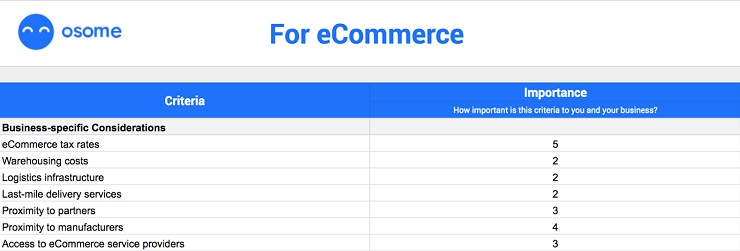
Ecommerce Tax
Some cities require ecommerce businesses to charge sales tax. This means that you may need to charge your customers extra or absorb the taxes. Either way, it will impact your operational costs or product price point. We think this is very important – 5.
Melbourne scores 2 and Hong Kong scores 5:
From 1 July 2018, non-resident ecommerce sellers have to register for GST with the Australian government, and charge 10% tax on any B2C sales to Australia, from overseas, if they have Australian revenue of over AU$75,000 per year. In contrast, Hong Kong does not have any VAT or GST.
Warehousing Costs, Logistics Infrastructure, Last-Mile Delivery Services
The importance of these factors varies depending on your exact business model.
In Acme Snap’s case, they’re adopting a drop-shipping model. Their manufacturer will take care of production, warehousing, and drop-shipping of the item to the end customer, once an online order has been placed. Acme Snaps might need to store some stock on hand, but they won’t need to rent tonnes of warehouse space for that. That’s why we’ve ranked these items as unimportant – 2.
On the other hand, if you are taking charge of warehousing and shipping, then you need a city with good warehousing options, reasonable costs, strong logistics infrastructure, and access to last-mile delivery services. These factors would all be very important, so more like a 5.
Melbourne scores 4 and Hong Kong scores 2 on Warehousing:
Melbourne has had 2 million square meters of warehouse space added to its arsenal since 2014, while Hong Kong is famously land scarce.
A quick check of business, self-storage rental rates revealed:
- Hong Kong: starts from A$5.69 per square feet in Kowloon City, per month
- Melbourne: starts from A$3.27 per square feet in South Wharf, per month
Melbourne scores 3 and Hong Kong scores 4 on Logistics Infrastructure:
Melbourne has great facilities. It is Australia’s second-largest port and has a major airport to support air cargo services. However, Hong Kong is much stronger here, as it is a free port with massive connectivity to the rest of the world. They have a logistics hub on Lantau island, just two minutes from the airport and 40 minutes from China. Hong Kong International Airport is also one of the world’s largest air cargo hubs.
Proximity to Partners
Jon works with talented designers from around the world, to produce amazing designs for Acme Snaps. Jon occasionally travels to meet with them but mainly uses communication technology—FaceTime, Skype, etc.—for discussions. We score this as neither important nor unimportant – 3.
Melbourne scores 4 and Hong Kong scores 5:
Both are major cities served by major airlines and have strong internet infrastructure. Hong Kong has a slight advantage as it’s an important transit point for international flights.
Proximity to Manufacturers
Jon frequently communicates with the manufacturer using WeChat, and the production process for Acme’s snapbacks requires trips to China every quarter to ensure design and quality standards are satisfactory. Being closer would make things easier, but isn’t the most important factor. We score this as important – 4.
Melbourne scores 2 and Hong Kong scores 5:
Hong Kong is the clear winner when it comes to proximity to China.
Access to Ecommerce Service Providers
We give this a score of 3, neither important nor unimportant. Your access to ecommerce service providers like Squarespace, web hosting, payment processing services is not limited by geography.
Both Melbourne and Hong Kong score 5:
Your access to ecommerce service providers is equally strong in either of these cities.
Final Scores for Melbourne and Hong Kong
The template automatically calculates Melbourne and Hong Kong’s scores on each criterion, so you don’t have to do anything here.
You’ve done 90% of the work of deciding now. Each city’s score is the sum of their score on every criteria. It’s a tough fight but Hong Kong has slightly edged out Melbourne here. All Acme Snaps need to do now is to make a decision and get cracking on registering and incorporating their business!
Scenario B: A B2B Marketing Tech SaaS Startup
Now, let’s imagine we are setting up a SaaS startup we’ll call Magnificent. You can follow along again with the city scoring template.
Magnificent is a B2B SaaS startup co-founded by Maggie and Mike. After months of hard coding by Mike, they have an early prototype for their marketing technology. They’re ready to incorporate and also raise funds from investors so they can build a full-featured product. The next stage will be to bring clients from across Asia Pacific on board and then grow, grow, grow! They have more network and connections in Sydney but are also considering starting up in Singapore.
We’ll quickly run through the rationale behind how we scored general business conditions on importance, and spend more time on factors specific to a B2B technology startup.
Deciding Which General Business Conditions Are Important
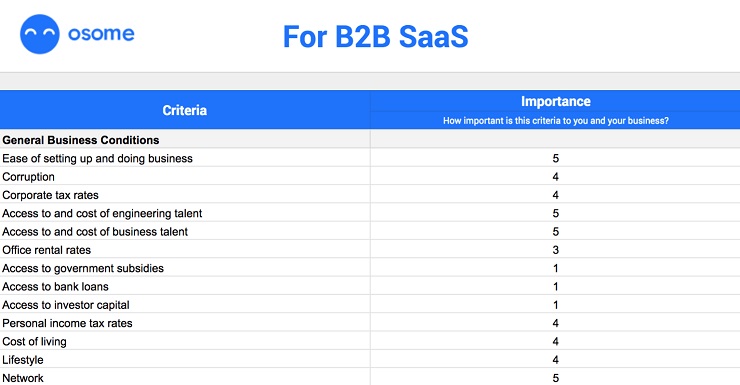
B2B SaaS is big business, and Magnificent hopes to be making deals with clients from all over Asia Pacific. Being incorporated in a city where it’s easy to set up a business and there are strong legal and regulatory systems (in case of contract disputes) will be extremely important.
Magnificent is also going to need lots of capital to move forward. In particular, they’re after investments from angel investors and VC firms, so access to investor capital is a deal-breaker.
Maggie and Mike will use the capital raised to beef up their tech and engineering team and build their product. Once their product is ready, they’ll bring on new business talent to help market, sell, and grow.
That’s why we’ve rated these factors as:
Ranking B2B SaaS-Specific Criteria
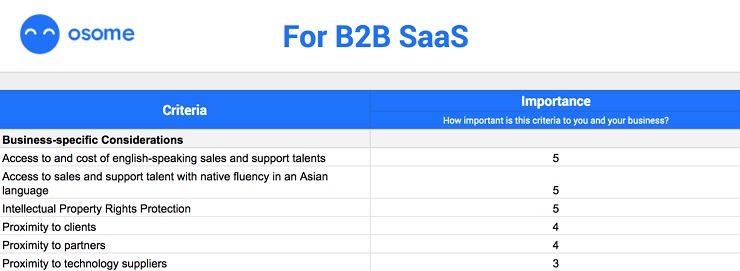
Access to and Cost of English-Speaking Sales and Support Talents
The importance of this factor depends on your exact B2B model—are you planning to have a self-serve SaaS model or a high-touch one? The latter requires a larger sales force, in which case, your access to quality sales talent is going to be a bottleneck.
Even in the case of the former, your self-serve model will probably start with a predominantly manual version and will still require supervision and intervention.
In this case, Magnificent is targeting clients in Asia Pacific whom they believe value that high-touch approach. This factor scores as very important – 5.
Sydney scores 5 and Singapore scores 4:
Both cities have plenty of English speakers. In terms of cost, the annual salary for Head of Sales roles in both cities seem generally well matched. Sydney scores a little higher because of its strength in quality customer support talents.
Access to Sales and Support Talent with Native Fluency in an Asian Language
The importance of this similarly depends on whether you have a self-serve or high-touch model, but is also dependent on your target consumer—are native-language speakers a must? Or are most of your target clients English speaking?
In Magnificent’s case, they’re targeting clients across Asia Pacific, including clients in China, Japan, Vietnam, Indonesia, Thailand, and more. They’ll need sales and customer support talents with native-speaker fluency (who also speak English) to have any hope of clinching deals and keeping customers happy.
This factor gets a 5.
Sydney scores 4 and Singapore scores 5:
As one of Australia’s largest cities and the capital city of New South Wales, Sydney is a diverse, metropolitan city. In fact, the most common languages spoken at home, aside from English, are Arabic (spoken by 4.4% of the population), Cantonese (3.4%), Mandarin (2.6%), Greek (2.2%) and Vietnamese (2.0%).
Singapore, however, is stronger in this criteria:
- 73.2% of its population speaks two or more languages, against 60.8% of Sydney’s residents who only speak English.
- 34.9% of Singapore’s residents speak Mandarin at home.
- Over 90% of its new citizens and Permanent Residents in 2018 came from Southeast Asia and Asia.
Intellectual Property Rights Protection
Since Magnificent is developing its own proprietary marketing technology, intellectual property rights (IPRs) like patents and copyrights are very important to them. It ensures that Magnificent can protect and benefit from their hard work, since it grants them a temporary, exclusive use of their patented technology, and prevents copycats.
Sydney scores 5 and Singapore scores 5:
According to the Intellectual Property Rights Index, Australia is ranked seventh globally and Singapore is ranked fifth. Both cities get a strength score of 5 – very strong.
Proximity to Clients
Once Magnificent gets their product up and running, they’ll need clients and revenue. They’re targeting mainly small- and medium-sized enterprises across Asia Pacific and also hope to clinch a few enterprise clients as well. Proximity to clients gets a 4.
Sydney scores 4 and Singapore scores 5:
Luckily, both Australia and Southeast Asia have vibrant startup scenes and plenty of unicorns and multinational corporations. Both Sydney and Singapore are major cities with plenty of international flights, however, Singapore scores stronger here because it’s a significantly shorter flight away from other Asia Pacific cities.
Proximity to Partners
Magnificent is in the business of marketing technology, so it makes sense to be close to and have access to key players in marketing and advertising, from top agencies to the likes of Facebook. This get an importance score of 4.
Sydney scores 4 and Singapore scores 5:
As major cities, Singapore and Sydney provide access to heavyweights like Facebook, Google, and Apple. Singapore does however house the APAC headquarters for Facebook and Google and hence gets a stronger score.
Proximity to Technology Suppliers
We give this a score of 3, neither important nor unimportant. Your access to technology vendors or even a lead-nurturing tool is not dependent on your location.
Both Sydney and Singapore score 5.
Final Scores for Sydney and Singapore
The template automatically calculates Sydney and Singapore’s scores on each criterion, so you don’t have to do anything here.
You’re almost done. Each city’s score is the sum of their score on every criterion and this gets calculated automatically. In this example, Sydney edged out Singapore on general business conditions but Singapore scored higher when it comes to B2B SaaS-specific criteria.
All Magnificent has to do now is to make a decision and press on! Whether they decide on Sydney or Singapore, this exercise has one additional benefit. They now know how their startup location impacts their strengths and weaknesses as a business, and can make sure to address their weaknesses with planning and strategy.
EXCLUSIVE FREE TRAINING: Successful Founders Teach You How to Start and Grow an Online Business
Using This Template for Other Industries
This template is completely customizable for any industry and any business. The same scoring principle of Importance x Strength can be used to help you with your decision-making process on the best cities to start a business.
Ready to find the best city to set up your business? Leave us a comment below once you’ve tried out our scoring template and let us know which city stood out for you, or if you have any other questions we can help you with!
